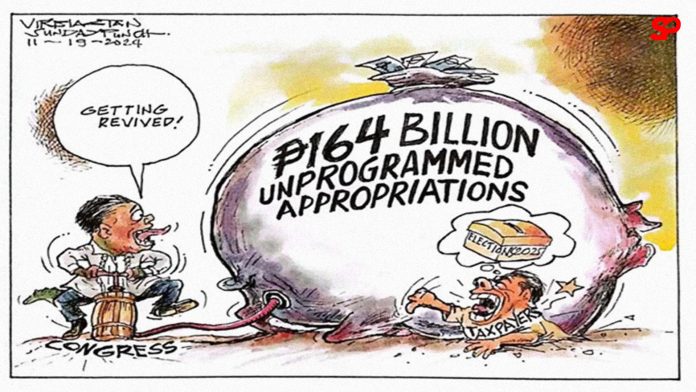Illustration by: Virgilio Biagtan
The Philippine government’s recent allocation of a staggering P593 trillion in “unprogrammed funds” within the 2024 national budget has reignited discussions about transparency and accountability. Unprogrammed funds, essentially a reserve for unforeseen expenditures, have long been a tool for addressing national needs as they arise. However, the lack of clear programming for these funds raises serious concerns. Critics draw uncomfortable parallels to the controversial “pork barrel” system—funds that were often used with little oversight and subject to misuse for political patronage. While intended to be a safety net for urgent expenses, the sheer scale of these funds and the lack of stringent oversight have amplified fears of a repeat of the excesses of past administrations.
The allocation of these unprogrammed funds, which has increased the budget by over P160 billion, has sparked alarm bells across various sectors. Unprogrammed funds are typically allocated for programs that may require emergency financing, such as calamity relief, but the scope of their use has often been murky. This loophole creates opportunities for funds to be diverted, making it harder for taxpayers to track their usage. Although these funds may serve a legitimate purpose in responding to unforeseen circumstances, the absence of clear guidelines and monitoring systems leaves ample room for exploitation, particularly in an environment where political influence is prevalent. Given that the previous administration was embroiled in numerous scandals involving pork barrel misuse, the current move to raise unprogrammed funds without a clear framework for their use is troubling.
The public’s growing scrutiny of this issue underscores the need for greater transparency and accountability in the management of national funds. Lessons should have been learned from past abuses, and systems should be put in place to ensure that the funds are used for their intended purposes. The 2024 budget, now ballooning to P5.93 trillion, signals an opportunity for the government to modernize its fiscal practices, providing a blueprint for future administrations to follow. It is imperative that the government ensures these unprogrammed funds are subject to greater scrutiny, with clear reporting mechanisms to avoid the recurrence of mismanagement. The public must not be left to wonder where their hard-earned taxes are going. If the goal is truly to serve the people, then the allocation of resources must be as transparent and accountable as the needs it seeks to address.
This moment also offers an opportunity to discuss how fiscal governance can evolve beyond reactive measures. A shift toward proactive financial planning and a stronger emphasis on localized, community-driven budgets could foster long-term growth and resilience. Without such a shift, the risk remains that unprogrammed funds will continue to function as a political tool rather than an instrument for national development. With public trust at stake, this issue must be handled with the utmost care and transparency.

